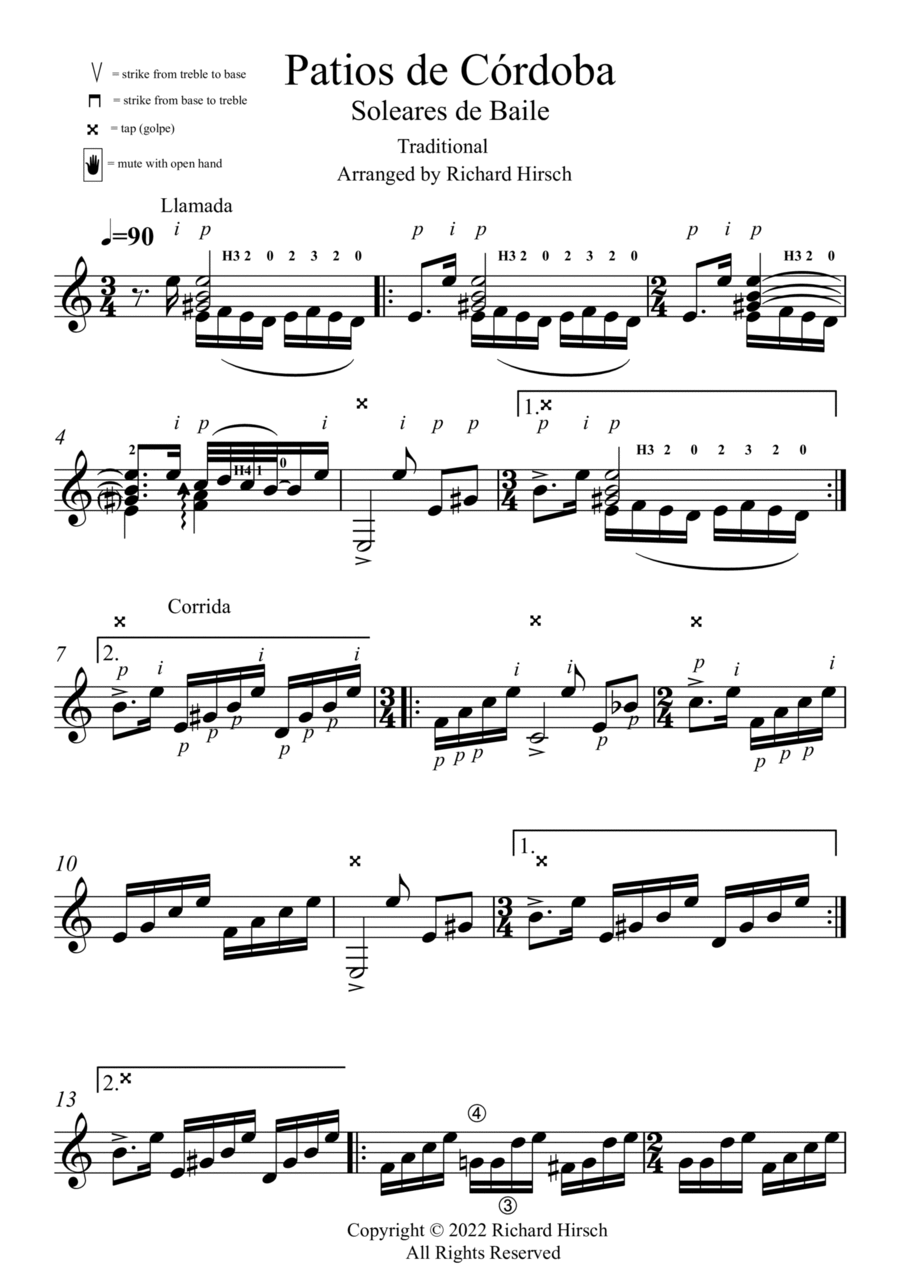Solo Guitar - Level 2 - Digital Download SKU: A0.594506 Composed by Traditional. Arranged by Richard Hirsch. Folk,Instructional,Multicultural,Traditional,World. Individual part. 5 pages. Richard Hirsch #203776. Published by Richard Hirsch (A0.594506). An arrangement of the Flamenco Soleares style (palo) for the dance (baile). The musical material for the arrangement is taken from standard traditional themes for the Soleares style of Flamenco. The arrangement is meant for guitarists and students of guitar that are new to Flamenco and want to learn the basics for one of the most important palos in Flamenco. The arrangement can be used to accompany a solo dance, customary in serious (jondo) Flamenco, often performed by a woman dancer. The Soleares rhythm consists of a repetition of a twelve beat phrase the Flamencos refer to as a compás where accents fall on the third, sixth, eight, tenth, and twelfth beats of the phrase (1 2 3 4 5 6 7 8 9 10 11 12). I notate the compás as a series of five measures that comprises two 3/4 measures followed by three 2/4 measures. Throughout the notation there is, therefore, a fluctuating between two measures in 3/4 and three measures in 2/4 time. The first beat of the compás falls on the second beat of the first 3/4 measure in the series and the first accented beat falls on the first beat of the second 3/4 measure. The sixth, eight, and tenth accented beats fall on the first beats of the 2/4 measures in the series. The twelfth beat falls on the first beat of the next series beginning with a 3/4 measure. Notating the compás in this manner allows the guitarist a total grasp of the underlying structure of the music, something that is often lost in other notations I have studied for Soleares. A command of the compás is essential for the guitarist to be able to work with Flamenco singers and dancers. The Soleares is a stately dance that moves at a moderate pace, but often ends in a finale (macho por BulerĂas) that is more than twice as fast as the first sections of the dance. The finale also contains a key change from the Phrygian mode of the llamadas and corridas to the key of E major. The arrangement contains essential basic techniques for Flamenco guitar, the rasqueado, the legato with hammering on, the four finger tremolo that rips at the strings before a full chord with the thumb, alzapĂşa where the thumb strikes in triplets down, up, down in rapid succession, etc. Students should dedicate themselves to a close and careful study of the notation to gain full mastery of these techniques. The arrangement consists of several sections, the llamadas which are calls to the dancer to take the stage, corridas where the dancer moves in a circle executing various heel and toe steps together with hand, arm, and body gestures, and the macho where the dance ends in a storm of stamping and a fit of wild abandon. The corrida sections consist of melodies Flamencos call “falsetas”. One of these is simply a series of broken chords while another is a melody taken from a song called “Caña” that is a member of the Soleares family. The notation ends, as is prescribed for the dance, on the tenth beat of the last compás (the first beat of the last 2/4 measure in the last five measure series). The Soleares was the first palo my maestro Juan González “Triguito” introduced me to in my studies with him in Madrid in the late 1960’s and is considered to be the “mother” of true forms of Flamenco. The title of the arrangement is in celebration of the beautiful patios of CĂłrdoba, home of the Flamenco palo Soleares.
